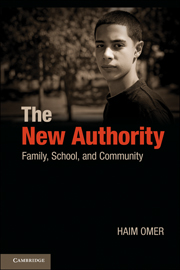Book contents
- Frontmatter
- Contents
- Foreword
- 1 The New Authority
- 2 Vigilant Care
- 3 Children's Violence Within the Home
- 4 Enlisting Support in the School
- 5 Presence and Supervision at School
- 6 Publicity and Reparation
- 7 Involving Students in the Campaign Against Violence
- 8 The New Authority in the Community
- References
- Index
8 - The New Authority in the Community
Published online by Cambridge University Press: 05 May 2016
- Frontmatter
- Contents
- Foreword
- 1 The New Authority
- 2 Vigilant Care
- 3 Children's Violence Within the Home
- 4 Enlisting Support in the School
- 5 Presence and Supervision at School
- 6 Publicity and Reparation
- 7 Involving Students in the Campaign Against Violence
- 8 The New Authority in the Community
- References
- Index
Summary
The new authority's approach to schools and its reliance on support networks create a chain reaction, which makes it by definition influential in the community. We saw how the promotion of the new authority strengthens the school's relationship with parents and other community parties. In those relationships, the school “exports” the new authority. Gradually, the concepts of escalation prevention, communal struggle, nonviolent resistance, and watchful care by parents and teachers become a common language for the various community elements coping with juvenile delinquency.
Parent Patrols
In different places in Israel and abroad, parents have organized patrols to reduce behaviors such as vandalism, violence, loitering, alcohol, and substance abuse on the street and in places where young people gather. However, some parents are embarrassed by the idea of parent patrols and suggest they are illegitimate. These reservations make parent patrols less attractive and stable. Many parents change their minds when they are exposed to the concept of the new authority. This approach provides a persuasive response to the parents’ hesitations and provides the backbone for turning the parents’ patrol into a solid and consequential social norm.
The Transition from the Language of “I” to “We”
Many parents are afraid to join a patrol out of fear of their children’s reaction to their appearance at their places of recreation.
- Type
- Chapter
- Information
- The New AuthorityFamily, School, and Community, pp. 237 - 276Publisher: Cambridge University PressPrint publication year: 2010



